
A friend caught me the other day and asked if I knew anything about smoke detectors. He was curious why his smoke alarm was going off for no apparent reason and what he should do about it. I didn’t have an answer for him, and it actually reminded me that one of my smoke detectors may be on the fritz too. A while back, one of our smoke detectors started beeping every so often. No big deal right? Just change the battery backup, and you’re good to go. Wrong. I still don’t know what the problem was but I’ve been doing some investigating.
Smoke Detector False Alarms
Other than burning food on the stove, here are a handful of common causes for smoke detectors to false alarm.
- Dust buildup
- Spiders (or other creepy crawlers)
- Excessive humidity
- Dead battery backup
- Sensor failure (more on that below)
To make matters more complicated, if you’re smoke detectors are hard-wired (like mine), then they often work in series (called multi-station). That means that the false alarm in the hallway triggers all the other smoke detectors too.
I only have two suggestions for troubleshooting a smoke detector. First, replace the battery backup. This might not be possible for some older units. If that’s the case, it’s probably time to replace the detector anyway. Second, give it a blast of compressed air. That should remove any dirt, dust or spider webs.
According to the U.S. Fire Administration, most smoke alarms should be replaced every 8 – 10 years, and when you swap them out it’s good practice to write the date of purchase somewhere inside the alarm. I’d suggest the battery backup compartment as that’s usually easy to access.
Replacing Your Smoke Detectors
I don’t know the age of my smoke detectors, but they look old. Given that I don’t have much faith in them anyway, I decided to swap em out. I picked up some new smoke alarms and chose to install a dual carbon monoxide sensor in the basement since that is near our only fuel-burning appliances.
Here’s old alarm.
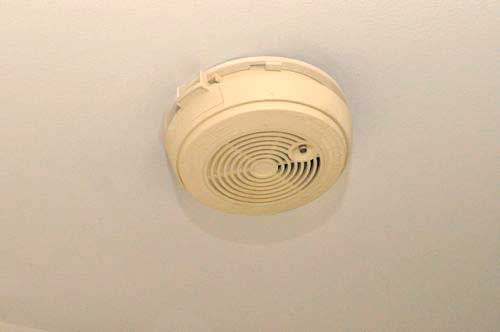
The old alarm had three wires coming into it. I used a simple volt tester until we switched off the appropriate breaker.

You can see the quick connect style wiring.
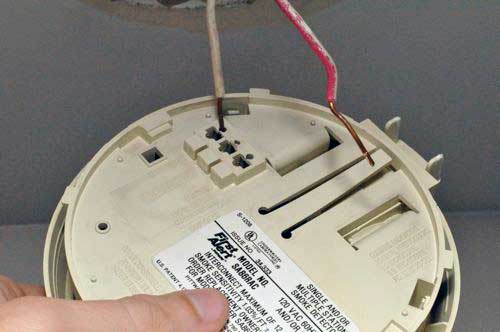
This picture shows the old mounting plate attached to the junction box and the three wires.
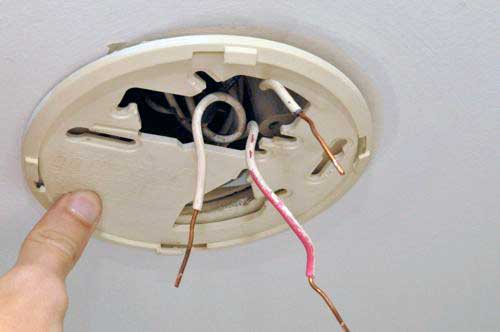
I took off the old plate and reused the screws for the new one.
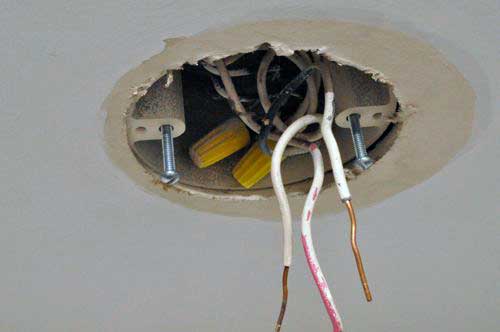
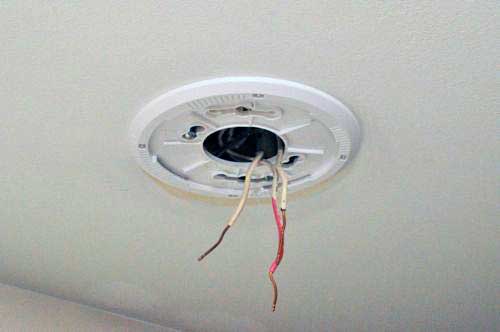
The new alarm had an adapter that would plug into the backside. Here’s an interesting tidbit. If you wire the alarm wrong, it goes off none-stop until you fix it (or disconnect it).
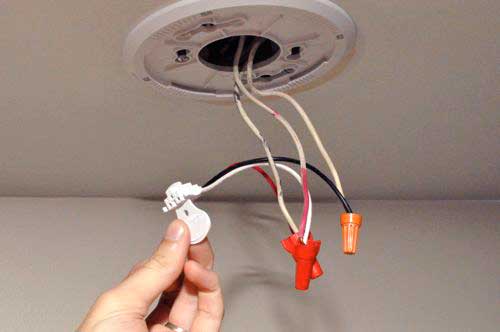
And here’s everything cleaned up.
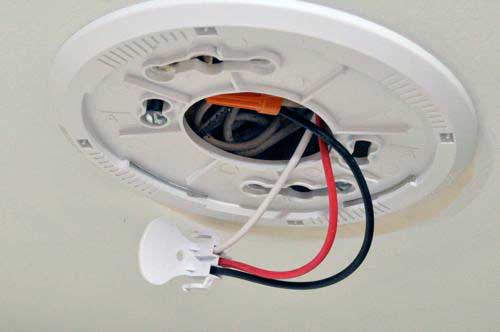
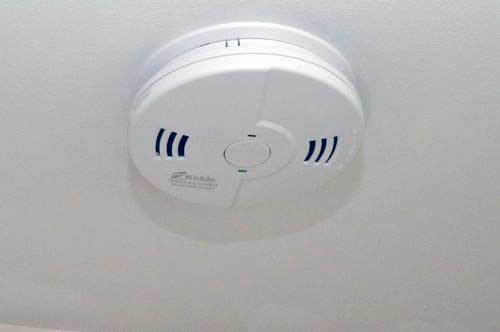
It’s important to install a UL listed alarm. Click here to learn more about their suggestions and some of the different types of smoke alarms available.
If you haven’t figured it out, birds and smoke detectors both chirp making them super-annoying when they wake you up in the night for no good reason.
How old are your alarms? Do you really replace the batteries every year? Who tests their alarms every month?







Thanks for the tips! This is a great reminder that we should probably get new smoke alarms. Up until now I relied on my, ahem, cooking to make sure the alarms were working.
Our home is just over eight years old this month so maybe that’s why the hardwired smoke detectors have been acting up the last year or so. What a pain! I know it’s safer to have them interconnected, but it’s a bit nerve wracking when they all go off. And like you said, usually in the middle of the night.
We change the batteries at least once a year. Probably more often twice a year since I never can remember if I changed them last time change so we just change them to play it safe.
Next time they go off we’ll have to try the air compressor. Or do you think spray air would work too?
We were wise not to put one too close to the kitchen in this home since…well, it was more a “dinners ready” bell with the way I cook.
Wow, thanks! I had no idea the actual smoke detects should be replaced. Only ever heard of changing out the batteries yearly.
We have one that is hardwired and it came with the house when we purchased it almost four years ago. Who knows how long it had been there before we came along?
Most people have no idea they need to be replaced. It was pure chance that I came upon that fact a couple years ago and replaced mine and told everyone I know to replace theirs. I wonder if it has to do with the half life of Americium (alpha particle source).
Did you install a heat detector as well? usually those go in the garage/attic.
IIRC the NEC now says that houses must have hardwired smoke detectors, they are a much better system precisely because they set all of them off when one goes off. It gives you more warning if, say, your basement is on fire and you are sleeping on the second floor.
At some point I will probably go through my house and install the hardwired detectors for this reason, but for now I will just deal with the battery ones that I have.
I just replaced the CO/explosive gas detector in my basement, it was giving an error and appears to be 8 years old, but its just a plugin one.
Hey Joe- I’m actually not familiar with heat detectors. Attics get pretty hot. What sets them off? A quick rise in temp?
Great tip about the NEC and IIRC.
IIRC is “If I Recall Correctly” I guess I am using it too much, because it has confused a few people. 🙂
The heat detectors can trigger at a specific temperature (lots at 135°), or with rate of rise (something like 12° per minute), I believe some do both as well.
They are best for places where a smoke detector would have far too many nuisance triggers, like kitchens and garages.
Reading the code here (Mass) it looks like hardwired detectors were required in 1975, and battery backups on said hardwired detectors in 1998.
It looks like the NEC has requirements about the wiring of a smoke detector, but the NFPA is where the recommendations about smoke detectors come from.
HA! I just figured it was another code or guideline that I hadn’t heard of 🙂
Nice! I live in a fairly new development that’s had quite a few problems with false alarms since it was built a little over two years ago even in alarms that had new batteries put in and everything else.
I’d guess a lot of that issue is construction dust that built up in the detectors because I’m pretty sure the contractor didn’t use the little shower caps to protect the detectors during the final phases of construction.
Thanks!
Oh so you wired it wrong huh 😉 hows the hearing?
If you notice in the pics, the wiring color was irrelevant. I got it all worked about in a couple minutes but man was it loud…
yeah… I see that red->white and white->red cross 🙂
Thanks Ethan…..I am inspired to replace my smoke alarms now. I think mine look even older than the ones you replaced. I will probably just replace all of them! Great post.
Our newest smoke alarms state on the backside to replace when 10 years old. Also, has a place to write in date purchased.
Good to know Mary Claire. Thanks.
A very useful blog post thank you
I am a little worse off – I cannot figure out how to open the wretched thing.
You clearly all worked out how to do that – can someone share?
Thanks
Mai-Britt
My Home is one year old and only one detector goes off. I check the wiring and changed the battery and it is still happening. It gives one beep once in awhile as if the battery needs replacing. The battery I replaced I bought that day and tested.